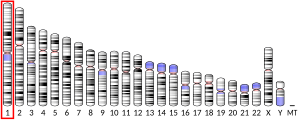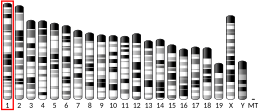From Wikipedia, the free encyclopedia
Protein-coding gene in the species Homo sapiens
Immunoglobulin superfamily member 8 is a protein that in humans is encoded by the IGSF8 gene .[ 5] [ 6] [ 7] CD316 (cluster of differentiation 316).
^ a b c GRCh38: Ensembl release 89: ENSG00000162729 – Ensembl , May 2017^ a b c GRCm38: Ensembl release 89: ENSMUSG00000038034 – Ensembl , May 2017^ "Human PubMed Reference:" . National Center for Biotechnology Information, U.S. National Library of Medicine .^ "Mouse PubMed Reference:" . National Center for Biotechnology Information, U.S. National Library of Medicine .^ Stipp CS, Kolesnikova TV, Hemler ME (Oct 2001). "EWI-2 is a major CD9 and CD81 partner and member of a novel Ig protein subfamily" . J Biol Chem . 276 (44): 40545–54. doi :10.1074/jbc.M107338200 PMID 11504738 . ^ Clark KL, Zeng Z, Langford AL, Bowen SM, Todd SC (Oct 2001). "PGRL is a major CD81-associated protein on lymphocytes and distinguishes a new family of cell surface proteins" . J Immunol . 167 (9): 5115–21. doi :10.4049/jimmunol.167.9.5115 PMID 11673522 . ^ "Entrez Gene: IGSF8 immunoglobulin superfamily, member 8" .
Strausberg RL, Feingold EA, Grouse LH, et al. (2003). "Generation and initial analysis of more than 15,000 full-length human and mouse cDNA sequences" . Proc. Natl. Acad. Sci. U.S.A . 99 (26): 16899–903. Bibcode :2002PNAS...9916899M . doi :10.1073/pnas.242603899 PMC 139241 PMID 12477932 . Charrin S, Le Naour F, Labas V, et al. (2003). "EWI-2 is a new component of the tetraspanin web in hepatocytes and lymphoid cells" . Biochem. J . 373 (Pt 2): 409–21. doi :10.1042/BJ20030343 . PMC 1223506 PMID 12708969 . Zhang XA, Lane WS, Charrin S, et al. (2003). "EWI2/PGRL associates with the metastasis suppressor KAI1/CD82 and inhibits the migration of prostate cancer cells". Cancer Res . 63 (10): 2665–74. PMID 12750295 . Bonkobara M, Das A, Takao J, et al. (2003). "Identification of novel genes for secreted and membrane-anchored proteins in human keratinocytes". Br. J. Dermatol . 148 (4): 654–64. doi :10.1046/j.1365-2133.2003.05244.x . PMID 12752121 . S2CID 21635573 . Stipp CS, Kolesnikova TV, Hemler ME (2004). "EWI-2 regulates alpha3beta1 integrin-dependent cell functions on laminin-5" . J. Cell Biol . 163 (5): 1167–77. doi :10.1083/jcb.200309113 . PMC 2173626 PMID 14662754 . Ota T, Suzuki Y, Nishikawa T, et al. (2004). "Complete sequencing and characterization of 21,243 full-length human cDNAs" . Nat. Genet . 36 (1): 40–5. doi :10.1038/ng1285 PMID 14702039 . Kolesnikova TV, Stipp CS, Rao RM, et al. (2004). "EWI-2 modulates lymphocyte integrin alpha4beta1 functions" . Blood . 103 (8): 3013–9. doi :10.1182/blood-2003-07-2201 PMID 15070678 . Gerhard DS, Wagner L, Feingold EA, et al. (2004). "The status, quality, and expansion of the NIH full-length cDNA project: the Mammalian Gene Collection (MGC)" . Genome Res . 14 (10B): 2121–7. doi :10.1101/gr.2596504 . PMC 528928 PMID 15489334 . Yang XH, Kovalenko OV, Kolesnikova TV, et al. (2006). "Contrasting effects of EWI proteins, integrins, and protein palmitoylation on cell surface CD9 organization" . J. Biol. Chem . 281 (18): 12976–85. doi :10.1074/jbc.M510617200 PMID 16537545 . Sala-Valdés M, Ursa A, Charrin S, et al. (2006). "EWI-2 and EWI-F link the tetraspanin web to the actin cytoskeleton through their direct association with ezrin-radixin-moesin proteins" . J. Biol. Chem . 281 (28): 19665–75. doi :10.1074/jbc.M602116200 PMID 16690612 . Kettner S, Kalthoff F, Graf P, et al. (2007). "EWI-2/CD316 is an inducible receptor of HSPA8 on human dendritic cells" . Mol. Cell. Biol . 27 (21): 7718–26. doi :10.1128/MCB.00180-07 . PMC 2169036 PMID 17785435 .
1–50 51–100 101–150 151–200 201–250 251–300 301–350



